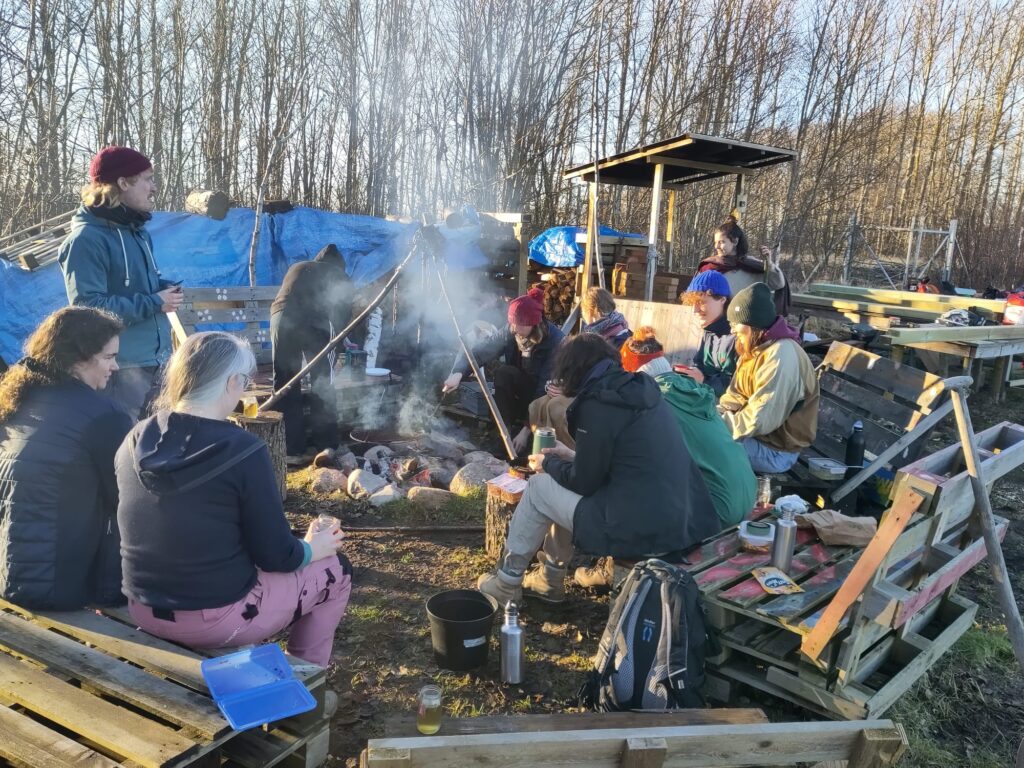In 2024, Alnarp’s Agroecology Farm collaborated with SIANI to publish its first Amplifying Stories of Agroecology Practices and Principles (ASAPP) case study, highlighting how the farm applies the 13 principles of agroecology. This project has become more than just a document, it has sparked discussions, inspired students, and strengthened the farm as a hub for sustainable agriculture. We met with two of the students and board members running the farm, Claire Feller and Leon Pepe Biundo, to hear about their experience working with SIANI, what ASAPP has meant for their farm, and what happens next!
Seeds for global change planted in the Swedish village of Alnarp

What is ASAPP?
ASAPP is a SIANI initiative highlighting practical applications of the HLPE 13 Principles of Agroecology within contrasting agricultural settings. Through a farmer-centred approach, SIANI strives to provide clear, accessible resources that enhance understanding and encourage the adoption of agroecological practices.
SIANI has collaborated with the students at Alnarp’s Agroecology Farm for many years, in particular around the Agroecology Day at SLU Alnarp. The students at the farm were therefore well aware of SIANI’s network when SIANI first approached them. They saw SIANI to be a trustworthy partner and a key player in the food systems hub. Yet, the scale of ASAPP’s impact took them by surprise “…we were all not prepared for the massive impact it would have”, Claire reflects when we meet her and her colleague Leon in Stockholm after SIANI’s annual meeting. “I was hoping that ASAPP would amplify our story. So much good work is done but often it is not well communicated. ASAPP has very certainly done that”, Leon continues. What followed was a conversation about being regarded as equal partners, building global relationships and recognising the transformative potential for change as what started as a small student project.
Equal partnerships with other stakeholders
Through ASAPP, SIANI provided Alnarp’s Agroecology Farm with the credibility needed for the farm to be seen as a partner by other organisations, such as SLU, MiljöMatematik Malmö and SLU Global. Over time, perceptions of the farm have shifted, moving from a student-led farm to a professional farm making an impact: “For two years, we were seen as the student farm, like, ‘these kids running around, playing around and having fun’. We needed an image change and ASAPP made that happen because suddenly a lot of things changed”, Claire says.
”ASAPP’s emphasis on the farm’s strong social and community component led them to apply for other types of funding focusing on the social aspects. As a result, they successfully applied for funding on social impact and were selected as one of the winning teams of the Menu for Change Challenge.”
Amplifying their work to new funders
After the ASAPP study was published, SIANI invited Claire and Leon to participate at the World Food Forum flagship event in 2025 in Rome, where the leaflet was used to communicate their story to raise advocacy and attract new funding opportunities, Claire explains. For example, ASAPP’s emphasis on the farm’s strong social and community component led them to apply for other types of funding focusing on the social aspects. As a result, they successfully applied for funding on social impact and were selected as one of the winning teams of the Menu for Change Challenge, giving them the opportunity to present at the IFT FIRST 2025 expo in Chicago in the summer of 2025.
Exchanging experiences with students across the world
The collaboration with SIANI has also formed new partnerships. During the SIANI’s side event at the WFF in Rome, the farm connected with the Coalition of Action 4 Soil Health (CA4SH). Being seated at the same table led to a dialogue between CA4SH and Alnarp’s farm, resulting in potential collaborations that involve students from low and middle-income countries.
“I think our biggest outcome was connecting with CA4SH. We sat at the same table with Daniela [Solis, coordinator of CA4SH], and afterwards, Daniela told us ‘We love what you do, and we want to collaborate’. Since then, we have been working on bringing people from the Global South to the Alnarp farm as interns supported by CA4SH and SLU. We will show them what we think of agroecology in our context, walk them through the principles, and then they can pick whatever solutions they think are nice and take them back [to their countries]”, says Leon.
SIANI as a catalyser
One opportunity led to another, amplifying Alnarp’s work across new and exciting forums. Leon explains: “I ended up going to Uppsala for Soil Health Conference, and Claire went to Brussels […] A minor image change with a massive impact, which we also didn’t really think about. […] This leaflet and this project have given us a different stage. Before we were very content with working in our local environment – now I feel like it has opened a door to a different level.” According to Claire, reaching out and sharing knowledge with a wider network also aligns with the principles of agroecology.
Inspiring global change
The collaboration with SIANI has cultivated more ideas for the future. Both Claire and Leon hope to share the story of the farm further and hopefully connect to and visit other agroecological farms globally. “There is more demand for our story and people are getting inspired. We realise that the change we can make in this world is bigger than what we can do at our farm only”, Leon says.